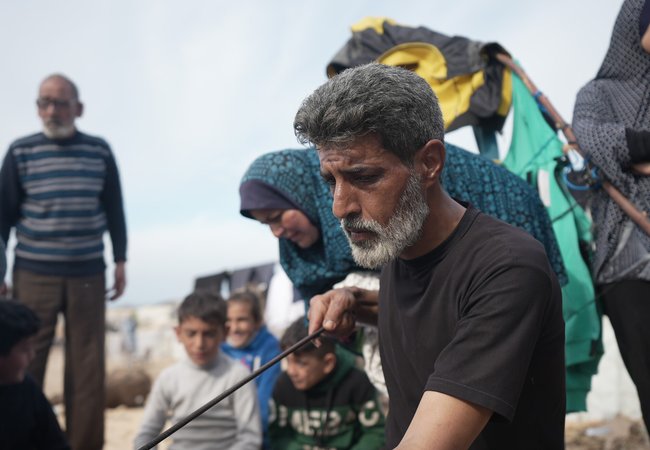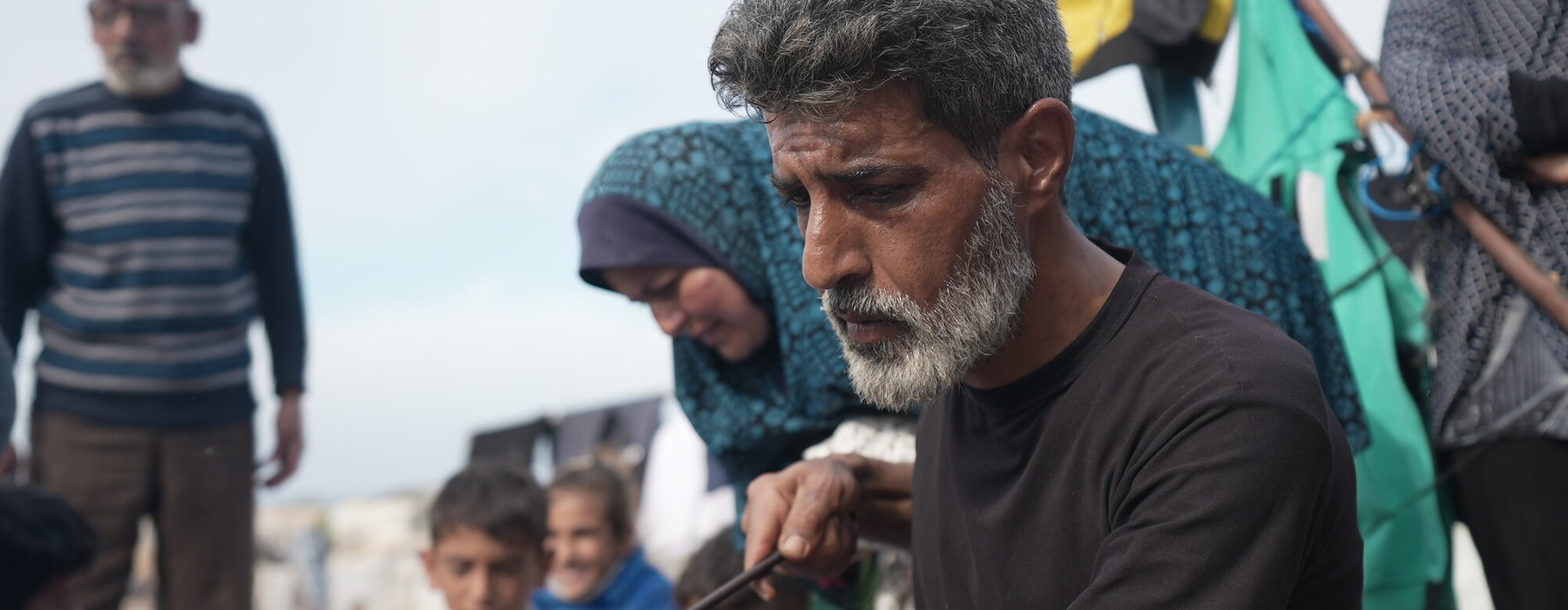Mutaz* and his family in Gaza were compelled to evacuate to a place declared a safe zone with promised aid. Unfortunately, upon their arrival, they discovered no assistance available, and endure harsh living conditions. Image: Alef Multimedia/Oxfam


Things you need to know about famine
Here are some things you need to know about famine.
What is famine?
Famine means an extreme food crisis, when many people can’t access the food and nutrition they need in order to survive.
During a famine, huge numbers of people die. Not necessarily from hunger: they can also die from diseases, because their bodies have become weak from poor nutrition. For people forced to go without food for a long time, even mild diseases can kill.
Causes of famine
Lots of different factors can lead to a lack of food...
- Armed conflict and hostilities means increased levels of violence, displacement and lack of access to basic services or humanitarian assistance. Breakdown in government and institutions can make it harder to get food and water.
- Climate change means extreme weather events are becoming more frequent and more severe, making it even more difficult for communities to recover after each
- Droughts and floods destroy crops and livelihoods.
- Livestock, vital for the survival of the communities, die from lack of food and water.
But whatever the cause, famine is never a natural disaster, it is human-made. Famine can be prevented, if people in power make the right choices. A declaration of famine is a declaration of failure.
When is famine declared?
The United Nations and other organisations, including Oxfam, use five categories to determine levels of food insecurity in a region.
These are known as the “Integrated Phase Classification” (IPC). Most of the IPC levels are already very serious – IPC 3 is “crisis” and IPC 4 is “emergency”.
But famine can only be declared when a country or region reaches the worst level, IPC 5: “catastrophe/famine”.
At IPC 5:
- 1 in 5 households experience an extreme lack of food and other basic needs.
- More than 30% of children suffer from acute malnutrition.
- There are 2 deaths per 10,000 people, or 4 child deaths per 10,000 children, every day.
Why do we need famine declarations?
Often, governments will only start significantly funding a crisis response once a famine has already been declared. Yet emergency levels are reached long before governments declare a famine, and they know that their choice to delay will cost thousands of lives.
It should never take famine and deaths to spur governments and institutions into action. Even one person dying for lack of something as basic as food is indefensible.
Yet so often people in lower-income countries are suffering and dying from preventable problems, because the people with the most power, money and influence, fail to take action. With the necessary funding and early action, we can avoid famine and prevent so many deaths.
What countries have faced famine?
The last time famine was declared anywhere in the world was in South Sudan in 2017.
According to the latest Hunger Hotspots report by the World Food Programme (WFP), the countries with the highest level of concern include Burkina Faso, Mali, South Sudan, Sudan and the Occupied Palestinian Territory.
Is there a famine in Gaza?
Several months of conflict and a total siege of Gaza means that right now, the levels of hunger and starvation in Gaza are the highest ever recorded on the IPC scale.
The 2024 Global Report on Food Crises found that the number of people on the brink of famine has almost doubled globally since last year. The majority are in Gaza, where children are already dying of malnutrition and disease as a result of the Israeli government’s policy of using starvation as a weapon of war.
The entire population of Gaza is currently facing high levels of acute food insecurity. And half of the population are experiencing catastrophic food insecurity. Famine is projected to occur imminently in the northern regions of Gaza, where there is the least access to humanitarian aid.
This is a human-made famine. The Israeli authorities are denying Gazans access to sufficient food, which is a serious violation of international humanitarian law. Oxfam has warned that people living in Gaza will suffer mass death from disease and starvation unless Israel takes immediate steps to end its collective punishment of people and allow enough food and water into Gaza.
Why is there imminent famine in Gaza?
Oxfam’s report, Inflicting Unprecedented Suffering and Destruction, identifies seven crucial ways that Israel is actively preventing the delivery of international aid into Gaza.
- A total military siege amounting to collective punishment.
- An unjustifiably inefficient process of aid inspection protocols.
- Arbitrary rejections of ‘dual [military] use items’ (stopping items like fuel that can be used to cook by saying it can be used for weapons).
- Decimation, destruction and disruption.
- Attacks on aid workers, humanitarian facilities and aid convoys.
- Forced displacement and an absence of safety.
- Systematic denial of humanitarian missions and access restrictions on humanitarian workers.
The Israeli authorities are using starvation as a weapon of war, and deliberately depriving Palestinians in Gaza of life and safety. The suffering is systemic and of such scale and intensity that it creates a real risk of a genocide in Gaza.
An immediate and permanent ceasefire is urgently needed to enable food, water, and other aid to freely flow. The siege of Gaza must end.
What is Oxfam doing in Gaza?
Oxfam has worked in the Occupied Palestinian Territory (where Gaza is) and Israel since the 1950s, supporting communities to tackle the root causes of conflict, build resilience to sudden shocks and protect their rights.
Oxfam partners — The Palestinian Medical Relief Society (PMRS), Juzoor, the Culture & Free Thought Association (CFTA), and Palestinian Environmental Friends (PEF) — are responding in their communities, distributing vouchers and cash for food along with hygiene items such as soap, shampoo, menstrual products and toothpaste to people living in makeshift shelters in Rafah and Khan Younis, in the south of the Gaza strip.
The continuing bombardment, and restriction on goods entering Gaza, has made a full-scale humanitarian response impossible.
What can I do?
We're calling on the UK Government to:
- Use all diplomatic levers at its disposal to help secure an immediate and permanent ceasefire. This is the only realistic and effective way to alleviate suffering and save lives, as well as help secure the release of hostages from Gaza.
- Push for an end to the total siege of Gaza.
- Stop UK arms sales to Israel immediately as there is a risk of them being used in serious violations of international law.
- Call for a path to a lasting and just peace for all Palestinian and Israeli people.
A declaration of famine is a declaration of failure. If enough of us continue to speak up and put pressure on the UK Government, we can help secure a lasting ceasefire to prevent more children, women, and men from dying of preventable deaths.
